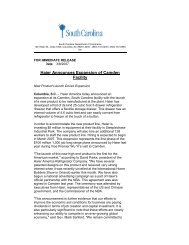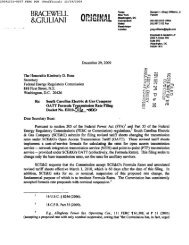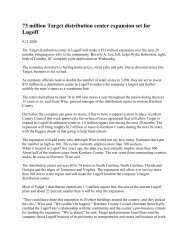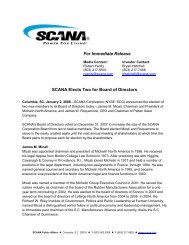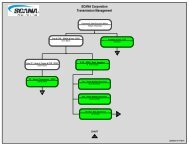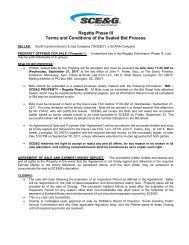10-K - SCANA Corporation
10-K - SCANA Corporation
10-K - SCANA Corporation
Create successful ePaper yourself
Turn your PDF publications into a flip-book with our unique Google optimized e-Paper software.
Table of Contents<br />
PSNC Energy’s rates are established using a benchmark cost of gas approved by the NCUC, which may be adjusted<br />
periodically to reflect changes in the market price of natural gas. PSNC Energy revises its tariffs with the NCUC as necessary to track<br />
these changes and accounts for any over- or under-collections of the delivered cost of gas in its deferred accounts for subsequent rate<br />
consideration. The NCUC reviews PSNC Energy’s gas purchasing practices annually. In addition, PSNC Energy utilizes a CUT which<br />
allows it to adjust its base rates semi-annually for residential and commercial customers based on average per customer consumption.<br />
In January 2012, the NCUC approved a five cent per therm decrease in the cost of gas component of PSNC Energy’s rates.<br />
The rate adjustment was effective with the first billing cycle in February 2012.<br />
In December 2011, in connection with PSNC Energy’s 2011 Annual Prudence Review, the NCUC determined that PSNC<br />
Energy’s gas costs, including all hedging transactions, were reasonable and prudently incurred during the 12 months ended March 31,<br />
2011. On February 2, 2012, the Public Staff of the NCUC filed a motion requesting that the NCUC reconsider and modify its order by<br />
reassigning certain charges (totaling approximately $0.4 million) from the cost of gas. PSNC Energy cannot predict the outcome of<br />
this matter, but the Company does not believe it will have a material effect on the Company’s results of operations, cash flows, or<br />
financial condition.<br />
In October 2011, the NCUC approved a five cent per therm decrease in the cost of gas component of PSNC Energy’s rates.<br />
The rate adjustment was effective with the first billing cycle in November 2011.<br />
In October 20<strong>10</strong>, the NCUC approved a 12.5 cent per therm decrease in the cost of gas component of PSNC Energy’s rates.<br />
The rate adjustment was effective with the first billing cycle in November 20<strong>10</strong>. In February 20<strong>10</strong>, the NCUC approved a ten cent per<br />
therm increase in the cost of gas component of PSNC Energy’s rates. The rate adjustment was effective with the first billing cycle in<br />
March 20<strong>10</strong>.<br />
ENVIRONMENTAL MATTERS<br />
Federal and state authorities have imposed environmental regulations and standards relating primarily to air emissions,<br />
wastewater discharges and solid, toxic and hazardous waste management. Developments in these areas may require that equipment<br />
and facilities be modified, supplemented or replaced. The ultimate effect of these regulations and standards upon existing and<br />
proposed operations cannot be predicted. For a more complete discussion of how these regulations and standards impact <strong>SCANA</strong> and<br />
SCE&G, see the Environmental Matters section of Management’s Discussion and Analysis of Financial Condition and Results of<br />
Operations for <strong>SCANA</strong> and SCE&G and Note <strong>10</strong> to the consolidated financial statements for <strong>SCANA</strong> and SCE&G.<br />
OTHER MATTERS<br />
For a discussion of SCE&G’s insurance coverage for Summer Station Unit 1and the New Units, see Note <strong>10</strong> to the<br />
consolidated financial statements for <strong>SCANA</strong> and SCE&G.<br />
ITEM 1A. RISK FACTORS<br />
The risk factors that follow relate in each case to <strong>SCANA</strong> and its subsidiaries, and where indicated the risk factors also relate to<br />
SCE&G and its consolidated affiliates.<br />
Commodity price changes, delays and other factors may affect the operating cost, capital expenditures and competitive positions of<br />
the Company’s and Consolidated SCE&G’s energy businesses, thereby adversely impacting results of operations, cash flows and<br />
financial condition.<br />
Our energy businesses are sensitive to changes in coal, natural gas, oil and other commodity prices (as well as their<br />
transportation costs) and availability. Any such changes could affect the prices these businesses charge, their operating costs and the<br />
competitive position of their products and services. Consolidated SCE&G is permitted to recover the prudently incurred cost of fuel<br />
(including transportation) used in electric generation through retail customers’ bills, but fuel cost increases affect electric prices and<br />
therefore the competitive position of electricity against other energy sources. In addition, when natural gas prices are low enough<br />
relative to coal to require the dispatch of gas-fired electric generation ahead of coal-fired electric generation, higher inventories of<br />
coal, with related increased carrying costs, may result. This may adversely affect our results of operations, cash flows and financial<br />
position.<br />
15



